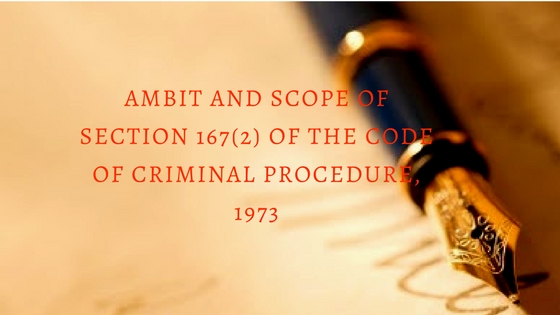Aapka Consultant Judgment Series- In this series, we are providing case analysis of Landmark Judgments of Hon’ble Supreme Court of India.
Union of India v. Nirala Yadav
AIR 2014 SC 3036: (2014) 9 SCC 457
JUDGES: Dipak Misra and N.V. Ramana
Date of Decision: 30-06-2014
FACTS:-
The facts were that the accused-respondent was arraigned for the offences punishable under Sections 302, 304, 353, 323, 147, 148, 149 of IPC and under Section 27 of the Arms Act and under Section 49(2) b) of Prevention of Terrorist Activities Act (POTA) for murder of Sanjay Kumar Singh, Divisional Forest Officer. FIR was filed against him to set the criminal law in motion and investigation commenced. But however, no charge-sheet was filed after the statutory period of 90 days and the respondent-accused filed an application under Section 167(2) of Cr. PC for release on bail. The Ld. Special Judge dismissed the application and the respondent moved to the High court, which overturned the order of Ld. Special Judge. In response to that, this appeal has been filed by special leave.
ISSUE:-
Whether impugned order overturning order refusing bail and extending benefit to accused was sustainable?
JUDGMENT:-
The Hon’ble Supreme Court observed in the present matter, that prior to the expiry of 90 days which is the initial period for filing charge-sheet, the prosecution had neither filed the charge-sheet not had it filed an application for extension of time. Thereafter, when the respondents filed an application for seeking bail under Section 167(2) of Cr. PC, the prosecution filed an application seeking extension of time for filing charge-sheet and the court granted it. The Court opined that such procrastination frustrates the legislative intent. A Court cannot act in the manner which extinguishes the right of an accused. If the law confers such rights on the accused then it has to prevail. The Court observed that there accrued an indefeasible right in the favour of the accused to be released on bail if the investigating agencies have failed to complete investigation within the stipulated time period of 90 days mentioned in the statute. The Court must dispose of the bail application under Section 167(2) on the same day itself.
Further, the court observed that the Court should not keep an application filed under Section 167(2) after expiry of the statutory period pending to enable the investigation to file the charge-sheet to defeat the indefeasible right of an accused. If the court is granting time to the prosecution and not adverting to the application filed by the accused under the said section then it would be violation of the legislative mandate. An application by the prosecution for the extension of time for filing the charge-sheet cannot be entertained by the court after the expiry of prior period prescribed, while keeping the bail application under Section 167(2) of Cr. PC pending. The prosecution cannot adopt such methods to frustrate or destroy the legal right of the accused.
The accused can avail such right only by filing the application under Section 167(2) of Cr. PC and it is the duty on the part of the court to verify the records available as well as from the public prosecutor that whether the time has expired and whether the charge-sheet has been filed or not, and to dispose of the application accordingly. The expression ‘availed of’ to mean actually being released on bail after furnishing the necessary bail required, but if the challan has been filed before that, then there is no question of exercising a right arise, howsoever indefeasible it may be. The said right would stands lost and the accused would be released on bail only on the merits.
HELD:-
The Court held that there is no error in the order of the High court in overturning the order refusing bail and extending the benefit to the accused-respondent under Section 167(2) of Cr. PC. There arises an indefeasible right on the part of the accused to be released on bail if the investigation has not been completed within the stipulated time period of 90 days. The indefeasible right accruing to the accused can be enforceable only prior to filing of challan and it does not survive, if already not availed of.
To Get Legal Opinion from Advocates/ Legal Experts, Please click here
To Get Legal Opinion from Retired Hon’ble Judges, Please click here












